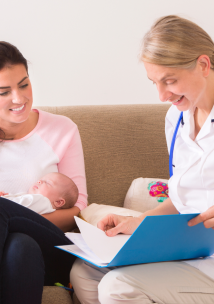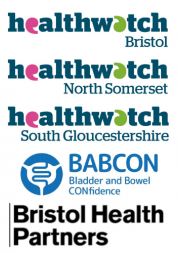Report: lessons from health visiting during COVID-19

Health visiting services are provided in South Gloucestershire by Sirona Care and Health. In March 2020, due to the COVID-19 pandemic, all baby hubs in the area closed and the health visiting service announced that due to staff being redeployed to support other NHS services, scheduled reviews would not take place.
Many of the woman we heard from said they received no clear explanation about what to expect from the health visiting service, and less than half were told the purpose of the visits. Some mums had not had any contact from a health visitor at all, and many reported difficulties contacting the health visiting service, which left them feeling unsupported.
There were concerns that there wasn’t the opportunity to talk about their own mental health, either because they didn’t have contact with a health visitor or because it wasn’t broached as a subject during a visit. This reflects the national, regional, and local issues with accessing appropriate and timely mental health support.
I was suffering depression - we were first-time parents during a pandemic with people not able to visit. We felt abandoned.
Our recommendations include offering women the option of a face-to-face or longer first appointment, mandatory training in mental health for health visitors, and ensuring maternity staff provide effective explanations to parents about their transition to the health visiting service.
Our recommendations
For now
-
Ensure first-time appointments are flexible to offer face-to-face if needed, or longer session than others, to give time for information to be shared and questions to be asked and answered, and relationships to be built.
-
Ensure that there is mandatory training in mental health for health visitors so that they feel confident discussing mental health conditions.
-
Take steps to standardise and normalise the signposting and recording of support for women with existing mental health conditions.
-
Having a process to check mothers’ engagement with support for mental health.
-
Health visitors help to build awareness of the local Maternity Voices Partnership to encourage mums to feed back their experiences and provide opportunities for the service to learn from this qualitative feedback.
-
Set up learning opportunities between community midwifes and HVs to ensure maternity staff provide effective explanations to parents about their transition to HV
Future proofing
-
Carefully consider or mitigate against any changes to postnatal support (health visitor, breastfeeding, weighing clinics) by considering impact on maternal mental health.
-
Where appointments cannot be in person, ensure phone or virtual appointments take place and are an in-depth conversation about mother and baby.
-
Adhere to the Accessible Information Standard; provide Easy Read, translated resources and alternative formats in addition to online resources.
Mary Lewis, Director of Nursing and Quality at Sirona Care & Health thanked us for a 'very comprehensive and helpful report', and invited those who took part in our research to help with Sirona's work to transform public health nursing, which includes the health visiting service.
This work is to ensure wherever someone lives in Bristol, North Somerset and South Gloucestershire they will be able to access the same level of support.
Deirdre Fowler, Chief Nurse and Midwife at University Hospitals Bristol and Weston NHS Foundation Trust, said "understanding what matters to women as part of their maternity care is central to improving the quality-of-care women and their partners receive from us. We would like to thank Healthwatch South Gloucestershire for undertaking this work and sharing the report and recommendations with us."
Maria Kane, Chief Executive of North Bristol Trust, said "whilst this report highlights many areas of good practice, there are clearly some areas for improvement. We look forward to extending our system working and recognise that cross organisation working between NBT and the HV service is important in order to provide the service that our women and families deserve."
Downloads
If you would like to share your experience of health visiting with us, click the pink 'Talk to us' button below.

